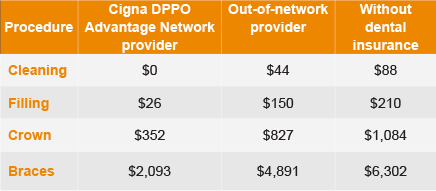Cigna DPPO Advantage Network:
Dentists that have contracted with Cigna and agreed to accept a predetermined contracted fee for the services provided to Cigna customers. Visiting a provider in this network means you’ll save the most money, because the fee is discounted.
Out-of-Network:
Providers who have not contracted with Cigna to offer you savings. They charge their own standard fees.
Calendar Year Maximum:
The most your plan will pay during a calendar year (12-month period beginning each January 1st). You’ll need to pay
100% out-of-pocket for any services after you reach your calendar year maximum.
Lifetime Maximum:
The most your plan will pay during your lifetime. You’ll need to pay 100% out-of-pocket for any services after you reach
your lifetime maximum.
Coinsurance:
Your share of the cost of a covered
dental service (a percentage amount).
Calendar Year Deductible:
The dollar amount you must pay each
year for eligible dental expenses before
the insurance will pay.
Lifetime Deductible:
The dollar amount you must pay once in your lifetime for eligible dental expenses before the insurance plan will pay.
Maximum Allowable Charge (MAC):
The most Cigna will pay a dentist for
a covered service or procedure for
out-of-network dental care.
Standard Fee:
The fee that a provider charges to
a patient for a service who does not
have dental insurance.
Contracted Fee:
The fee to be charged for a service that Cigna has negotiated with a contracted provider on your behalf.




